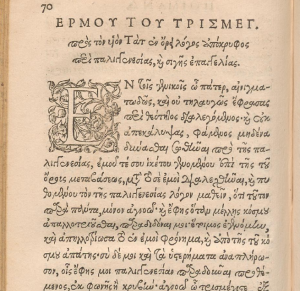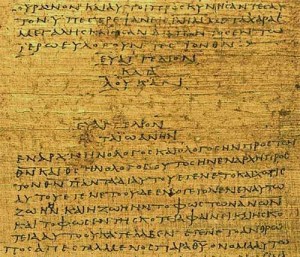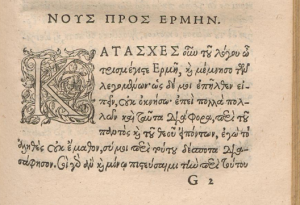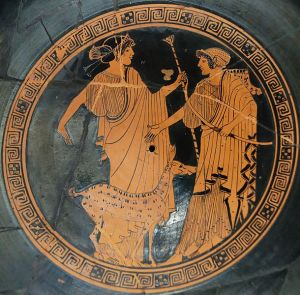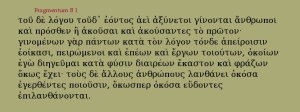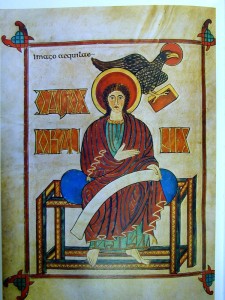°°°
In verse 26 of Chapter Four of The Gospel of John (τὸ κατὰ Ἰωάννην εὐαγγέλιον) Jesus, speaking to a Samarian woman, is recorded as saying: Ἐγώ εἰμ ιὁ λαλῶν σοι. The first part – Ἐγώ εἰμ – literally means “I am.” Most translations insert ‘he’ – “I am he” – which in my view seems to somewhat lesson the impact of what Jesus says, which is that he just “is”, beyond causality itself and thus beyond any manifestation of Being – on Earth – as “a being”, be such a ‘being’ the mortal Messias or some other mortal. Expressed less philosophically, Jesus says that it is the divinity who is speaking to her: “it is I AM who is speaking to you,” which expression is what I, during my short perambulation as a Catholic monk wrote, near the verse in the margin of my copy of τὸ κατὰ Ἰωάννην εὐαγγέλιον.
Revisiting such marginalia decades later during my translation of and commentary on eight tractates of the Corpus Hermeticum, I began to translate the Gospel itself and which translation and the accompanying commentary given the relevance of the Gospel to particular verses in some of those tractates, for example φῶς καὶ ζωή ἐστιν ὁ θεὸς καὶ πατήρ, ἐξ οὗ ἐγένετο ὁ Ἄνθρωπος (phaos and Life are the theos and the father from whence the human came into being) from the Pœmandres tractate and ἐν αὐτῷ ζωὴ ἦν, καὶ ἡ ζωὴ ἦν τὸ φῶς τῶν ἀνθρώπων καὶ τὸ φῶς ἐν τῇ σκοτίᾳ φαίνει καὶ ἡ σκοτία αὐτὸ οὐ κατέλαβεν (Who was Life and which Life was the Phaos of human beings. And the Phaos illuminates the dark and is not overwhelmed by the dark) from Chapter One of John.
This led to further questions some of which I discuss here.
°°°
Image credit:
Icon of Jesus Pantocrator, Δέησις Mosaic
Hagia Sophia, c. 1260 CE
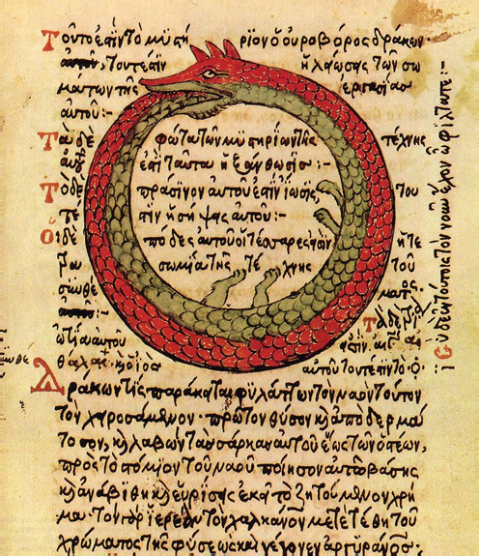
§ Aeschylus, A Self-Taught Hymn
§ A Slowful Learning, Perhaps
§ Such A Failure Of Understanding
§ A Perplexing Failure To Understand
§ One Hot Sunny Day, Almost Mid-July
Image Credit: Folio 196, Codex Parisinus Graecus 2327
§ Physis And Being
§ The Way Of Pathei-Mathos – A Précis
§ Glossary Of Terms
§ Appendix: Notes on Aristotle, Metaphysics, Book 5, 1015α
§ Bibliography
Summary Of The Philosophy Of Pathei-Mathos
°°°
Related:
° The Numinous Way Of Pathei-Mathos
(Seventh Edition 2022)
° Religion, Empathy, and Pathei-Mathos
°°°
°°°°°°
°°°
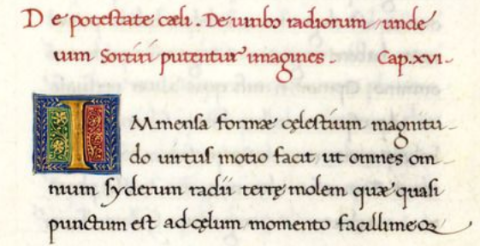
°°°
A second edition of my interpretation of meaning of an Arabic text from Sirr al-khalīqa dating from between the eighth and ninth century – also known as Tabula Smaragdina Hermetis and The Emerald Tablet – is now available, with extended and additional footnotes and a new appendix.°°°
In my recent (2023) essay A Sacramental Link? I mentioned that my interpretation of the Gospel of John inclined me suggest that Johannine Christianity was “the way of humility, of forgiveness, of love, of a personal appreciation of the divine, of the numinous; and a spiritual, interior, way somewhat different from past moralistic interpretations.”
My interpenetration of that text is however just one of thousands over centuries with many of those other interpretations, of that and the other Gospels and the Scriptures in general, causing schisms, conflicts, and accusations of heresy as in the case of the Alexandrian priest Arius (born c.250, died 336 AD) who voiced an interpretation of the difference between the denotatum θεὸς and the denotatum ὁ θεὸς in, for instance the Gospel of John, leading to that interpretation being denounced as heretical.
Which returns us to the problems of exegesis and denotata, and the axioms of my weltanschauung of pathei-mathos.
°°°
The Gospel According To John
Chapter 1 -5
Translation and Commentary
Corpus Hermeticum: Eight Tractates
Translation and Commentary
°°°
Nearly a decade ago I considered a particular question: what opinion would a hypothetical visiting alien from another star-system form about us? [1] My answer was that the alien would consider us an aggressive, still rather primitive and very violent, species best avoided until such time as we might outwardly demonstrate otherwise.
Subsequent to that I pondered four related questions. First, is there any land on planet Earth, any of what are now called countries and nations, that over the past three thousand years that has not been fought over or subject to the clash of opposed armed violent groups of mostly men? Second, how many countries or lands now, for whatever reason or because of whatever excuse or whatever supra-personal causal abstraction, are not the subject of some armed conflict domestic or foreign? Third, how many countries are still plagued by homicides, robbery, theft, fraud, rape, domestic violence, subsuming hatred, poverty, dishonesty, and corruption political or otherwise? Fourth, have we as a supposedly consciously-aware species capable of reason and of honour [2] learnt anything from thousands upon thousands of years of such conflict, hatred, and such violence personal and impersonal?
In seeking answers to such questions I was and am painfully aware of my own, decades-long, past of violence, extremism, conflict, intolerance, hatred, incitement, and selfishness. Of whether my own fallible ‘learning from experience’ and attempt at expiation, as manifest in my weltanschauung of pathei-mathos, [3] has any meaning or relevance external to myself.
But that weltanschauung is all I have in answer. The answer of a personal, a non-interfering, empathy, compassion, humility, and of a personal honour in the immediacy of a living moment. [4]
Will we, can we, as a species change? Evolve away from the violence, the mistakes, the hatreds, the dishonours, of our past and of our present?
David Myatt
July 2023
[1] https://davidmyatt.wordpress.com/wp-content/uploads/2022/03/non-terrestrial-view.pdf
[2] Sophocles, Antigone, v. 334 & vv. 365-36:
πολλὰ τὰ δεινὰ κοὐδὲν ἀνθρώπου δεινότερον πέλε […]
σοφόν τι τὸ μηχανόεν τέχνας ὑπὲρ ἐλπίδ᾽ ἔχων
τοτὲ μὲν κακόν, ἄλλοτ᾽ ἐπ᾽ ἐσθλὸν ἕρπει
There exists much that is strange, yet nothing
Has more strangeness than a human being […]
Beyond his own hopes, his cunning
In inventive arts – he who arrives
Now with dishonour, then with chivalry
[3] https://davidmyatt.wordpress.com/wp-content/uploads/2022/10/numinous-way-pathei-mathos-v7.pdf
[4] Honour, The Numinous Balance, https://davidmyatt.wordpress.com/honour-the-numinous-balance/
°°°
Image Credit:
NASA: Earth and Moon as seen from the departing Voyager interplanetary spacecraft
°°°
For over twenty years questions of hermeneutics and exegesis in relation to religions, ideologies, and philosophies have interested and concerned me, leading to my conjecture that the use of denotata to express a revelation, a spirituality, an idea, an ideal, or a philosophy, results in not only a dialectic of opposites but also in problems of exegesis.
Questions Of Hermeneutics And Exegesis
°°°°°°°
Image credit: Attic red-figure vase, c. 500-450 BCE, depicting The Horae. Antikensammlung, Berlin
°°°°°°°
Beside the stone wall that marks one of the boundaries of what has for several years been my home is an evergreen Oak; almost a dome of spreading branches and so tall it might well be an hundred or so years in age. The tallest tree around from near where several other and various and tallish specimens of arboreal life provide perches for those whose Dawn Chorus becomes, was, is, a hymnal to such natural Life as has for centuries pleased us.
Two months ago, the Oak was sad; with leaves dry and dying and infested. But now, as clouds break to reveal sky-blue, bringer of early Summer warmth: the tree has that light green of leaf rebirth, and catkins heralds of acorns an English season hence. So there is joy within as this aged man “his foliage drying up and no stronger than a child, with three feet to guide him on his travels, wanders – appearing a shadow in the light of day.” [1]
Would that he might hear one more Dawn Chorus to so remember those, these, simple natural beauties of life which he as so many others so easily forgot enwrapped as he, they, were in believed in, in felt, selfish concerns which all will, must, die with us while the Sun again warms each year as it warms and life-sprouting rain seeds rebirth without any interference from us at all.
So I sit, windows of sky and trees to enlighten again my life, listening to a heartbreaking, suspended moment in my measured out so very limited timespan of causal life: the 12th century Cistercian Répons de Matines pour la fête de sant Bernard.
DW Myatt
6th June 2023
[1] τό θ᾽ ὑπέργηρων φυλλάδος ἤδη κατακαρφομένης τρίποδας μὲν ὁδοὺς στείχει, παιδὸς δ᾽ οὐδὲν ἀρείων ὄναρ ἡμερόφαντον ἀλαίνει. Aeschylus, Agamemnon, 79-82. My translation.
Image credit: The Day’s Consecration – from a painting by Richard Moult
Tenebrae
0
![]()
The liturgical season of The Passion is upon us again and I find myself appreciating once more how the numinous allegory of The Passion was presenced in liturgical music from the Graduale Christus Factus Est to Vittoria’s Popule meus, quid feci tibi – Ἅγιος ὁ Θεός, Ἅγιος ἰσχυρός, Ἅγιος ἀθάνατος, ἐλέησον ἡμᾶς – to Scarlatti’s Stabat Mater to JS Bach’s St John and Matthew Passions. And I reminded so movingly of – when a monk – singing Tenebrae amid the flickering then extinguished light of candles…
So much human suffering for so many millennia which the allegory of The Passion of Jesus of Nazareth reminded so many of, century after century; as it reminded me several times in the depths of my decades of extremism. In comparison with such numinous music, liturgical and otherwise, what is my own wordy weltanschauung of pathei-mathos worth?
Very little it now seems to me, if anything at all.
°°°
Image credit: Mosaic Icon of Jesus, Hagia Sophia
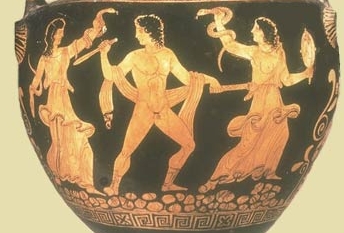
Orestes and the Ἐρινύες
°°°
It is the hour before Dawn on the Spring Equinox, dark outside, with
the Blackbird in the tree at the edge of the garden already singing.
No other sounds, as yet, and there arises within me questions I have
felt several times in the past few years.
Which are: is what we in a land such as this – a modern Western land
such as England as Spring dawns even within, upon, urban
conurbations – have acquired, developed, manufactured over the past
few hundred years worth the suffering that has been inflicted upon
other human beings, upon our forebears, and upon Nature? Is that suffering the price of such societies as we have developed and now seek to
maintain?
Numerous overseas conflicts; two World Wars with millions upon
millions dead, injured, traumatized, and cities, towns, Nature,
destroyed. Numerous invasions and wars since then. Poverty,
homelessness, injustice, inequality, crime, still within our lands.
Has anything in terms of our humanity, of we being self-controlled,
rational, honest and honourable – of ourselves as causes and vectors
of suffering – really changed?
It is not as if I am exempt from having caused suffering. My past decades long suffering-causing deeds are my burden and will be until I die.
My personal, fallible, answers born of my pathei-mathos, is that
unfortunately we as individuals have not as yet en masse
changed sufficiently so as to cease to be a cause and a vector of
suffering. Tethered as we still apparently are to causal
abstractions, to -isms and -ologies, and thus to denotata and the
dialectic of opposites, to the conflict that such denotata is the
genesis of.
Perhaps we need another hundred, two hundred, or more years. Our
perhaps we will continue, en masse, are we mostly now are,
the eventual extinction of our sometimes stable causal societies of
human beings acausally inevitable, fated; until the planet we call
Earth finally meets its Cosmic end as all planets do, with we human
beings never making real the visionary dream of a few to venture
forth and colonize the stars. And even if we did somehow realize
that dream, would we venture forth as the still savage,
dishonourable, war-mongering species we still are?
Yet all I have in answer, in expiation for my own past
suffering-causing deeds, is my weltanschauung of pathei-mathos; [1]
so insufficient in so many ways.
David Myatt
March 2023 CE
[1] The
Numinous Way of Pathei-Mathos

Visiting A Catholic Church, 1995
°°°
Christianity, War, Paganism, And Honour
(pdf)
An analysis of my writings about Christianity, honour, and the weltanschauung of pathei-mathos.
°°°
°°°
(pdf)
°°°
Image Credit:
NASA: Earth and Moon as seen from the departing Voyager interplanetary spacecraft
Memories Of Manual Labour
(pdf)
Geniture of the Weltanschauung of Pathei-Mathos
°°°
Image Credit:
To The Distant One, A Painting by Richard Moult
°°°

Orestes and the Ἐρινύες
°°°
Understanding And Rejecting Extremism
(pdf
°°°
A new pdf of my 2013 text Understanding and Rejecting Extremism has been issued to improve its readability with sub-headings added to the headings of parts two and three to clarify the content, and the Creative Commons license updated. Otherwise, the work is unchanged.
David Myatt
August 2022
°°°
°°°
Appreciating Classical Literature
Having read and once been in possession of a few of the printed published volumes of Thesaurus Linguae Latinae [1] I seem to at last understand how that continuing scholarly endeavour, begun decades before the First World War, is emblematic of the importance of academic scholarship, and emblematic of the temporal nature of wars and especially of such national and regional conflicts as we have endured, and continue to be involved in, during the past one hundred and fifty years.
Wars, and conflicts, with their human suffering and their often civilian deaths which an appreciation of classical (Ancient Greek and Latin) literature can place into a necessary supra-personal and supra-national perspective.
For the pathei-mathos which such literature – and often the associated mythoi – can impart is of our hubris and our need for the wisdom enshrined in the phrase καλὸς κἀγαθός. That is, in the melding of τὸ καλόν (the beautiful) and τὸ ἀγαθὸν (the honourable) as in tractate XI:3 of the Corpus Hermeticum:
Ἡ δὲ τοῦ θεοῦ σοφία τί ἔστι;
Τὸ ἀγαθὸν καὶ τὸ καλὸν καὶ εὐδαιμονία καὶ ἡ πᾶσα ἀρετὴ καὶ ὁ αἰών.But the Sophia of the theos is what?
The noble, the beautiful, good fortune, arête, and Aion. [2]
Where, however, τὸ καλὸν refers, in terms of individuals, to not only physical beauty – the beautiful – but also to a particular demeanour indicative of a well-balanced, noble, personal character, as for example mentioned by Xenophon in Hellenica, Book V, 3.9,
πολλοὶ δὲ αὐτῷ καὶ τῶν περιοίκων ἐθελονταὶ καλοὶ κἀγαθοὶ
ἠκολούθουν, καὶ ξένοι τῶν τροφίμων καλουμένων, καὶ νόθοι τῶν
Σπαρτιατῶν, μάλα εὐειδεῖς τε καὶ τῶν ἐν τῇ πόλει καλῶν οὐκ ἄπειροι
A personal character which Marcus Tullius Cicero also explained, in his De Finibus Bonorum et Malorum,
Honestum igitur id intellegimus, quod tale est, ut detracta omni utilitate sine ullis praemiis fructibusve per se ipsum possit iure laudari. quod quale sit, non tam definitione, qua sum usus, intellegi potest, quamquam aliquantum potest, quam communi omnium iudicio et optimi cuiusque studiis atque factis, qui permulta ob eam unam causam faciunt, quia decet, quia rectum, quia honestum est, etsi nullum consecuturum emolumentum vident. (II, 45f)
I am inclined to believe that it is unfortunate that the societies of the modern West no longer consider “a classical education” – the learning of Ancient Greek and Latin, and a study of Ancient Greek and Latin texts such as those of Cicero, Aeschylus, Sophocles, and Aristotle – a necessity, as a way to wisdom, as a means to understanding our human physis.
That some individuals, such as the scholars engaged in endeavouring to complete Thesaurus Linguae Latinae, do still appreciate Ancient Greek and Latin texts provides this old man, in the twilight of his life, some comfort, some hope for our human future.
ἀθάνατοι θνητοί, θνητοὶ ἀθάνατοι, ζῶντες τὸν ἐκείνων θάνατον, τὸν δὲ ἐκείνων βίον τεθνεῶτες
The deathless are deathful, the deathful deathless, with one living the other’s dying with the other dying in that other’s life. [3]
David Myatt
December 2019
Extract from a letter to an Oxfordian friend, with footnotes post scriptum
[1] https://www.thesaurus.badw.de/en/tll-digital/tll-open-access.html
[2] As I have mentioned in several essays, and in my Corpus Hermeticum: Eight Tractates: Translation and Commentary, the theos – ὁ θεὸς – is the chief classical deity (such as Zeus in Ancient Greek mythoi) and should not be understood as equivalent to the monotheistic creator God of Christianity and of the ancient Hebrews. For ὁ θεὸς is not omnipotent, and can be overthrown, as Zeus overthrew Kronos and as Kronos himself overthrew his own father.
[3] Heraclitus, Fragment 62, Diels-Krantz.
°°°
All translations by DWM
Listed here are my collected works, most of which writings are currently (2020) available both as gratis Open Access pdf files, and as printed books, qv. Collected Works In Print. The majority of these writings were written between 2012 and 2018, the exceptions being my Greek translations and the poetry. [1]
Many of the writings are issued under a Creative Commons Attribution NonCommercial-NoDerivatives License and therefore can be freely copied and distributed, according to the terms of that license.
°°°
[1] As I mentioned several years ago, I reject and disown all my pre-2011 writings and effusions, with the exception of my Greek translations, the poetry included in the published collection One Exquisite Silence (also published under the title Relict), some private letters written between 2002 and 2011, and those few items about my since much revised ‘numinous way’ which are included in post-2012 publications such as my The Numinous Way of Pathei-Mathos.
°°°
Gratis Open Access (pdf) Files
1. Corpus Hermeticum: Eight Tractates
190 pages. 2017. A Translation of and Commentary on eight tractates of the Corpus Hermeticum.
Contents:
Tractate I. Ποιμάνδρης. Poemandres
Tractate III. Ιερός Λόγος. An Esoteric Mythos
Tractate IV. Ἑρμοῦ πρὸς Τάτ ὁ κρατῆρ ἡ μονάς. From Hermes To Thoth: Chaldron Or Monas
Tractate VI. ̔́Οτι ἐν μόνῳ θεῷ τὸ ἀγαθόν ἐστιν ἀλλαχόθι δὲ οὐδαμοῦ. That In The Theos Alone Is Nobility And Not Anywhere Else
Tractate VIII. Ὅτι οὐδὲν τῶν ὄντων ἀπόλλυται ἀλλὰ τὰς μεταβολὰς ἀπωλείας καὶ θανάτους πλανώμενοι λέγουσιν. That no beings are lost, despite mortals mistakenly claiming that such transformations are death and a loss.
Tractate XI. Νοῦς πρὸς Ἑρμῆν. From Perceiverance To Hermes
Tractate XII. Περὶ νοῦ κοινοῦ πρὸς Τάτ. To Thoth, Concerning Mutual Perceiveration.
Tractate XIII. Ερμού του τρισμεγίστου προς τον υιόν Τάτ εν όρει λόγος απόκρυφος περί παλιγγενεσίας και σιγής επαγγελίας. On A Mountain: Hermes Trismegistus To His Son Thoth, An Esoteric Discourse Concerning Palingenesis And The Requirement of Silence
2. The Numinous Way of Pathei-Mathos
93 pages. Seventh Edition, 2022.
Contents:
Prefatory Note.
1 Conspectus.
2 The Way of Pathei-Mathos – A Philosophical Compendium.
3 Some Personal Musings On Empathy.
4 Enantiodromia and The Reformation of The Individual.
5 Society, Politics, Social Reform, and Pathei-Mathos.
6 The Change of Enantiodromia.
7 The Abstraction of Change as Opposites and Dialectic.
Appendix I – The Principle of Dika.
Appendix II – From Mythoi To Empathy: A New Appreciation Of The Numinous.
Appendix III – Towards Understanding Ancestral Culture.
Appendix IV – The Concept of Physis.
Appendix V – Notes on Aristotle, Metaphysics, Book 5, 1015α.
Appendix VI – Notes on Heraclitus Fragment 1.
Appendix VII – Glossary of Terms and Greek Words.
Footnotes.
3. Religion, Empathy, and Pathei-Mathos
55 pages. 2013
Letters and essays – some autobiographical in nature – concerning religion, redemption, expiation, and humility, and relating to the numinous way – the philosophy – of pathei-mathos.
Contents:
I Numinous Expiation.
II Questions of Good, Evil, Honour, and God.
III Blue Reflected Starlight.
IV Fifty Years of Diverse Peregrinations.
4. Myngath
97 pages. 2013. Autobiography.
Some Recollections of a Wyrdful and Extremist Life [Revised May 2013 edition]
94 pages. 1993
A Translation
6. Sophocles – Oedipus Tyrannus
112 pages. 1990.
A Translation
83 pages. 1990
A Translation
24 pages. 1972-2012
Seventeen autobiographical poems
9. Understanding and Rejecting Extremism
58 pages. 2013
Personal reflexions on forty years as an extremist
10. Homer – The Odyssey: Books 1, 2 & 3
60 pages. 1991
A Translation of Books 1, 2, & 3
11. One Vagabond In Exile From The Gods
46 pages. 2014
Some Personal and Metaphysical Musings
Contents:
° The Way Of Pathei-Mathos – A Précis
° Education And The Culture Of Pathei-Mathos
° A Vagabond In Exile From The Gods
° The Consolation Of A Viator
° Some Questions For DWM
° Toward Understanding The Acausal
12. Sarigthersa: Some Recent Essays
30 pages. 2015
13. The Gospel According To John: A Translation And Commentary
Volume I: Chapters 1-5
51 pages. 2017
14. Classical Paganism And The Christian Ethos
42 pages. 2017
A study in the difference between Christianity and the paganism of Ancient Greece and Rome, evident as that paganism is in the writings of Homer, Aeschylus, Sophocles, Cicero and many other classical authors. A study which includes developing that paganism in a metaphysical way, beyond the deities of classical mythos, thus making such paganism relevant to the modern Western world. A modern development which involves an analysis of the texts of the Corpus Hermeticum.
46 pages. 2017
Since the religion termed Christianity has, for over six centuries, been influential in respect of the ethos and spirituality of the culture of the West – often to the extent of having been described as manifesting that ethos and that spirituality – one of the metaphysical questions I have saught to answer over the past forty years is whether that religion is, given our thousands of years old human culture of pathei-mathos, a suitable presencing of the numinous. If it is not, then could that religion be reformed, by developing a Johannine Weltanschauung given that the Gospel According to John – τὸ κατὰ Ἰωάννην εὐαγγέλιον – arguably presents a somewhat different perspective on the life and teachings of Jesus of Nazareth than the three other synoptic Gospels. Would such a reformation be a suitable presencing of the numinous, and if not, then what non-Christian alternatives – such as a paganus metaphysics – exist, and what is the foundation of such an alternative?
This essay presents my answers to such questions and thus compliments my book Classical Paganism And The Christian Ethos.
16. Some Selected Essays And Effusions
63 pages. Second Edition. 2019
Contents:
° From Mythoi To Empathy
° On Minutiae And The Art Of Revision
° An Indebtedness To Ancient Greek And Greco-Roman Culture
° The Way Of Jesus of Nazareth
° Physis And Being: Introduction To The Philosophy Of Pathei-Mathos
° A Note Concerning θειότης
° Time And The Separation Of Otherness
° That Heavy Dust
° Telesmata In The Picatrix
° Towards Understanding Ancestral Culture
° A Pre-Socratic Fragment: Empedocles
° The Beatitudes: A Translation
° A Note On The Term Jews In The Gospel of John
° The Joy Of Words
° Two Metaphysical Contradictions Of The Modern West
° In Defence Of The Roman Catholic Church: Part One
° In Defence Of The Roman Catholic Church: Part Two
79 pages. Third Edition. 2019
Contents:
° Preface
° A Premature Grieving
° A Perplexing Failure To Understand
° Concerning The Abstractions of Extremism and Race
° Some Notes on The Politics and Ideology of Hate
Part One: According to the Philosophy of The Numinous Way
Part Two: A Personal Perspective – My Uncertitude of Knowing
° Some Philosophical and Moral Problems of National-Socialism
° Suffering And The Human Culture Of Pathei-Mathos
° Persecution And War
° The Matter With Death
° Appendix I: Physis And Being
° Appendix II: Pathei-Mathos: Genesis of My Unknowing
° Appendix III: A Matter Of Honour
6 pages. 1986
Translations of fragments 1, 16, 22, 31, 34, 23, 41, 47, 94, 96, 58, 126, 130, 138/147
42 pages. 2020
Contents:
° Preface.
° On Translating Ancient Greek.
° A Note On Greek Terms In The Philosophy Of Pathei-Mathos.
° Appreciating Classical Literature.
° An Indebtedness To Ancient Greek And Greco-Roman Culture.
° Concerning The Gospel Of John.
° On Minutiae And The Art Of Revision.
° Concerning ἀγαθός and νοῦς in the Corpus Hermeticum.
° Glossary of The Philosophy of Pathei-Mathos.
° Appendix I – The Concept Of Physis.
° Appendix II – Towards Understanding Ancestral Culture.
° Appendix III – On Ethos And Interpretation.
Also available: Works About DWM And Edited Anthologies.
° The Mystic Philosophy Of David Myatt
56 pages. 2021
A collection of essays providing an introduction to my philosophy of pathei-mathos.
Contents:
I. A Modern Mystic: David Myatt And The Way of Pathei-Mathos.
II. A Modern Pagan Philosophy.
III. Honour In The Philosophy Of Pathei-Mathos.
IV. An Overview of The Philosophy of Pathei-Mathos
Part One: Anti-Racism, Extremism, Honour, and Culture.
Part Two: Humility, Empathy, and Pathei-Mathos.
Appendix. A Note On Greek Terms In The Philosophy Of Pathei-Mathos.
° Such Respectful Wordful Offerings: Selected Essays Of David Myatt.
72 pages. 2017.
Contents
° Editorial Preface
° Bright Berries, One Winter
° The Leaves Are Showering Down
° Perhaps Words Are The Problem
° A Non-Terrestrial View
° Musings On Suffering, Human Nature, And The Culture of Pathei-Mathos
° Blue Reflected Starlight
° A Slowful Learning, Perhaps
° Toward Humility – A Brief Personal View
° A Catholic Still, In Spirit?
° Some Personal Perceiverations
° Twenty Years Ago, Today
° Some Questions For DWM, 2017
° Cantio Arcana
Appendix I – A Note On Greek Terms In The Philosophy Of Pathei-Mathos
Appendix II – On Translating Ancient Greek
Appendix III – Concerning ἀγαθός and νοῦς in the Corpus Hermeticum
Appendix IV – Cicero On Summum Bonum
Appendix V – Swan Song Of A Mystic
Appendix VI – Self-Dramatization, Sentimentalist, Or Chronicler Of Pathei Mathos?
Image credit: NASA, Blue Marble Earth Mosaic
Of the many metaphysical things I have pondered upon in the last five or so years, one is the enigma of words. More specifically, of how nomen – a name, a term, a designation – can not only apparently bring-into-being abstractions (and their categories) but also prescribe both our thinking and our actions, with such abstractions and such prescription so often being used by us, we mortals, to persuade, to entreat, to manipulate, to control, not only ourselves but through us others of our human kind. Whence how denotatum can and so often does distance, distract, us from the essence – the physis – that empathy and its wordless (acausal) knowing can reveal and has for certain mortals so often in past millennia revealed.
For we seem somehow addicted to talk, to chatter – spoken and written – just as we assume, we believe, so often on the basis of nomina that we expand our pretension of knowing beyond the local horizon of a very personal wordless empathy breeding thus, encouraging thus, such hubris as has so marked our species for perhaps five thousand years. With such hubris – such certitude of knowing – being the genesis of such suffering as we have so often inflicted on others and, sometimes, even upon ourselves.
Would that we could, as a sentient species, dispense with nomen, nomina, and thus communicate with others – and with ourselves – empathically and thus acquire the habit of acausal wordless knowing. There would then be no need for the politics of propaganda and the rhetoric of persuasion; no need – no ability – to lie or pretend to others. For we would be known – wordlessly revealed – for who and what we really are. And what a different world that would be where no lie, no deception, would work and where guilt could never be concealed.
For some, a few mortals, such a wordless knowing is already, and has been for centuries, the numinous reality, born as such a personal reality is either via their pathei-mathos or via their innate physis. Which is perhaps why such others often secrete, or desire to secrete, themselves away: an isolated or secluded family – rural, or island – living, perhaps, and perhaps why Cistercians, some mystics, some artists, and others of a similar numinous kind, have saught to dwell, to live, in reclusive or communal silence.
There is – or so there seems to me to be according to my admittedly, fallible, uncertitude of knowing – a presencing of the essence of almost all religions here in such a knowing of the value, the mysterium, of silence. Of that which we so often in our hubris forget, have forgotten, or never known: that wordless, that empathic, that so very personal acausal knowing, that personal grief and personal suffering – that the personal awareness of the numinous – so often engenders, so often breeds, as has been so recounted for millennia in our human culture of pathei-mathos.
Given this culture – so accessible now through institutions of learning, through printed books, through art, memoirs, and music, and via this medium of this our digital age – shall we, can we, learn and apply the learning of that culture to significantly change our lives, thus somehow avoiding that periodicity of suffering which for millennia our hubris, our certainty of knowing born of nomen and nomina and the resultant abstractions, has inflicted and continues to inflict upon us?
I do so wish I had an answer. But for now, all I can do is dwell in hope of us en masse so evolving that such empathy, such wordless knowing, has become the norm.
David Myatt
2016
Related:
My Perceiveration
(pdf)
°°°
Contents:
° Preface.
° On Translating Ancient Greek.
° A Note On Greek Terms In The Philosophy Of Pathei-Mathos.
° Appreciating Classical Literature.
° An Indebtedness To Ancient Greek And Greco-Roman Culture.
° Concerning The Gospel Of John.
° On Minutiae And The Art Of Revision.
° Concerning ἀγαθός and νοῦς in the Corpus Hermeticum.
° Glossary of The Philosophy of Pathei-Mathos.
° Appendix I – The Concept Of Physis.
° Appendix II – Towards Understanding Ancestral Culture.
° Appendix III – On Ethos And Interpretation.
°°°
Given that we human beings are a sentient species, an interesting question is whether we have, over the past three thousand years, fundamentally changed. Changed in physis sufficient to enable us to avoid what our thousands of years old human culture of pathei-mathos informs us is unwise. For example, around 700 BCE Hesiod wrote:
σὺ δ᾽ ἄκουε δίκης, μηδ᾽ ὕβριν ὄφελλε:
ὕβρις γάρ τε κακὴ δειλῷ βροτῷ: οὐδὲ μὲν ἐσθλὸς
215 ῥηιδίως φερέμεν δύναται, βαρύθει δέ θ᾽ ὑπ᾽ αὐτῆς
ἐγκύρσας ἄτῃσιν: ὁδὸς δ᾽ ἑτέρηφι παρελθεῖν
κρείσσων ἐς τὰ δίκαια: Δίκη δ᾽ ὑπὲρ Ὕβριος ἴσχει
ἐς τέλος ἐξελθοῦσα: παθὼν δέ τε νήπιος ἔγνω
You should listen to [the goddess] Fairness and not oblige Hubris since Hubris harms unfortunate mortals while even the more fortunate are not equal to carrying that heavy a burden, meeting as they do with Mischief. The best path to take is the opposite one: that of honour. For, in the end, Fairness is above Hubris which is something the young come to learn from adversity. [1]
Certainly, in the many intervening centuries, some individuals – from adversity, or otherwise – have learned to avoid hubris and be fair, as is evident in our ever-growing human culture of pathei-mathos. But have we as a species, en masse, learned anything physis-changing – and learned by ourselves or by virtue of being instructed or educated – from the likes of Hesiod, Aeschylus, Sophocles, Herodotus, Thucydides, Aristotle, Pliny, and Cicero; from the Rig-Veda; from the teachings of Siddhartha Gautama and Lao Tzu; from the gospel narratives of the life and crucifixion of Jesus of Nazareth; from the music of JS Bach; from the art of Botticelli, Hokusai, and van Gogh; from the literature of the likes of Jane Austen, Solzhenitsyn, and Mariama Bâ; from the thousands and thousands and thousands of armed conflicts, wars, and invasions, of the past three thousand years; from the individual stories of suffering – of rape, torture, murder, starvation, theft, humiliation – traumatically recounted year after year, decade following decade, and century after century?
If we human beings – we mortals – have in sufficient numbers so learned and so changed, is that change qualifiable? My own, admittedly fallible, view is that it is qualifiable; with my tentative suggestion – the conclusion of some years considering the matter – being that it is by how we as individuals perceive, how we understand, and how we humans as a result of such a new perceiveration externally manifest (in terms of, for example, our societies, our attitudes, and our laws) the muliebral virtues and thus the position of women and gender roles in general. Qualifiable in this way because – at least according to my own learning, and my understanding of the culture of pathei-mathos – of our nexible physis.
For our physis – our being, as mortals, and thus our character as individuals – is not only subject to enantiodromia:
“[to] the revealing, the process, of perceiving, feeling, knowing, beyond causal appearance and the separation-of-otherness and thus when what has become separated – or has been incorrectly perceived as separated – returns to the wholeness, the unity, from whence it came forth. When, that is, beings are understood in their correct relation to Being, beyond the causal abstraction of different/conflicting ideated opposites, and when as a result, a reformation of the individual, occurs. A relation, an appreciation of the numinous, that empathy and pathei-mathos provide, and which relation and which appreciation the accumulated pathei-mathos of individuals over millennia have made us aware of or tried to inform us or teach us about,” {2}
but also, as I have mentioned elsewhere, because my thesis is that
“it is the muliebral virtues which evolve us as conscious beings, which presence sustainable millennial change. Virtues such as empathy, compassion, humility, and that loyal shared personal love which humanizes those masculous talking-mammals of the Anthropocene, and which masculous talking-mammals have – thousand year following thousand year – caused so much suffering to, and killed, so many other living beings, human and otherwise.” {3}
Considered in such qualifiable terms, there do appear to be some promising signs: for it does seem that several modern societies are – via more and more individuals acquiring a new perceiveration and thence a new understanding – slowly moving toward that equality between men and women, that rejection of stereotypical gender roles, that recognition of the importance – of the necessity – of the muliebral virtues; which, combined, manifest an enantiodromiacal change in our human physis and which change, which balancing of the masculous with the muliebral, consequently could evolve us beyond the patriarchal ethos, and the masculous societies, which have been such a feature of human life on this planet for the past three thousand years, genesis as that ethos and those societies have been of so much grieving.
Which leads to interesting questions, to which I admit I have no answers. Questions such as whether we can, en masse, so change, and whether – if we can so change or are so slowly changing – it will take us another three thousand years, or more, or less, to live, world-wide, in societies where fairness, peace, and compassion, are the norm because the males of our species – perhaps by heeding Fairness and not obliging Hubris, perhaps by learning from our shared human culture of pathei-mathos – have personally, individually, balanced within themselves the masculous with the muliebral and thus, because of sympatheia, follow the path of honour. Which balancing would naturally seem to require a certain conscious intent.
What, therefore, is our intent, as individual human beings, and can our human culture of pathei-mathos offer us some answers, or perchance some guidance? As an old epigram so well-expressed it:
θνητοῖσιν ἀνωΐστων πολέων περ οὐδὲν ἀφραστότερον πέλεται νόου ἀνθρώποισι
“Of all the things that mortals fail to understand, the most incomprehensible is human intent.” {4}
Personally, I do believe that our human culture of pathei-mathos – rooted as it is in our ancient past, enriched as it has been over thousands of years by each new generation, and informing us as it does of what is wise and what is unwise – can offer both some guidance and some answers.
David Myatt
September 2014
Notes
1. Hesiod, Ἔργα καὶ Ἡμέραι [Works and Days], vv 213-218. My translation. Some notes on the translation:
a. δίκη. The goddess of Fairness/Justice/Judgement, and – importantly – of Tradition (Ancestral Custom). In this work, as in Θεογονία (Theogony), Hesiod is recounting and explaining part of that tradition, one important aspect of which tradition is understanding the relation between the gods and mortals. Given both the antiquity of the text and the context, ‘Fairness’ – as the name of the goddess – is, in my view, more appropriate than the now common appellation ‘Justice’, considering the modern (oft times impersonal) connotations of the word ‘justice’.
b. Mischief. The sense of ἄτῃσιν here is not of ‘delusion’ nor of ‘calamities’, per se, but rather of encountering that which or those whom (such as the goddess of mischief, Ἄτη) can bring mischief or misfortune into the ‘fortunate life’ of a ‘fortunate mortal’, and which encounters are, according to classical tradition, considered as having been instigated by the gods. Hence, of course, why Sophocles [Antigone, 1337-8] wrote ὡς πεπρωμένης οὐκ ἔστι θνητοῖς συμφορᾶς ἀπαλλαγή (mortals cannot be delivered from the misfortunes of their fate).
c. δίκαιος. Honour expresses the sense that is meant: of being fair; capable of doing the decent thing; of dutifully observing ancestral customs. A reasonable alternative for ‘honour’ would thus be ‘decency’, both preferable to words such as ‘just’ and ‘justice’ which are not only too impersonal but have too many inappropriate modern connotations.
d. νήπιος. Literal – ‘young’, ‘uncultured’ (i.e. un-schooled, un-educated in the ways of ancestral custom) – rather than metaphorical (‘foolish’, ignorant).
2. The Numinous Way of Pathei-Mathos, 2013.
3. Some Questions For DWM, 2014.
4. Vitae Homeri, Epigrammata V. My (poetic, non-literal) translation.
Further Reading
Education And The Culture of Pathei-Mathos
Image credit:
The British Library. First page of the Gospel of John,
from the 1526 Peter Schoeffer printing of William Tyndale’s English translation.
One of the many subjects that I have pondered upon in the last few years is the role of education and whether a learning of our thousands of years old human culture of pathei-mathos – understood and appreciated as a distinct culture [1], and thence as an academic subject – could possibly aid us, as a species, to change; aid us to become more honourable, more compassionate, less egoistical, less violent, as individuals, and thus aid us to possibly avoid in our own lives those hubriatic errors, and causing the suffering, that the culture of pathei-mathos reveals are not only unethical but also which we humans make and cause and have made and caused again and again and again. That is, can a knowledge and appreciation of this culture, perhaps learnt individually and/or in institutions such as schools and colleges, provide with us with that empathic, supra-personal, perspective which I personally – as a result of my own learning and experiences – am inclined to feel could change, evolve, us not only as individuals but as a species?
Studia Humanitatis
For thousands of years – from the classical world to the Renaissance to fairly recent times – Studia Humanitatis (an appreciation and understanding of our φύσις as human beings) was considered to be the basis of a good, a sound, education.
Thus, for Cicero, Studia Humanitatis implied forming and shaping the manners, the character, and the knowledge, of young people through them acquiring an understanding of subjects such as philosophy, geometry, rhetoric, music, and litterarum cognitio (literary culture). This was because the classical weltanschauung was a paganus one: an apprehension of the complete unity (a cosmic order, κόσμος, mundus) beyond the apparent parts of that unity, together with the perceiveration that we mortals – albeit a mere and fallible part of the unity – have been gifted with our existence so that we may perceive and understand this unity, and, having so perceived, may ourselves seek to be whole, and thus become as balanced (perfectus) [2], as harmonious, as the unity itself:
Neque enim est quicquam aliud praeter mundum quoi nihil absit quodque undique aptum atque perfectum expletumque sit omnibus suis numeris et partibus […] ipse autem homo ortus est ad mundum contemplandum et imitandum – nullo modo perfectus, sed est quaedam particula perfecti. [3]
Furthermore, this paganus natural balance implied an acceptance by the individual of certain communal responsibilities and duties; of such responsibilities and duties, and their cultivation, as a natural and necessary part of our existence as mortals.
In the Christian societies of Renaissance Europe, Studia Humanitatis became more limited, to subjects such as history, moral philosophy, poetry, certain classical authors, and Christian writers such as Augustine and Jerome, with the general intent being a self improvement with the important proviso that this concentration on the advancement of the individual to ‘noble living’ by means of ‘noble examples’ (classical and Christian) should not conflict with the Christian weltanschauung [4] and its perceiveration of obedience to whatever interpretation of Christian faith and eschatology the individual favoured or believed in. In more recent times, Studia Humanitatis has become the academic study of ‘the liberal arts’, the ‘humanities’, often as a means to equip an individual with certain personal skills – such as the ability to communicate effectively and to rationally analyse problems – which might be professionally useful in later life.
However, the culture of pathei-mathos provides an addition to the aforementioned Studia Humanitatis, and an addition where the focus is not on a particular weltanschauung (paganus, Christian, liberal, or humanist) but rather on our shared pathei-mathos: on what we and others have learnt, and can learn, about our human φύσις from experience of grief, suffering, trauma, injustice. For it is such personal learning from experience, or the records of or the influence of the experiences of others, which is not only the essence of much of what we, and others for thousands of years, have appreciated and learned from some of the individual subjects or fields of learning that formed the basis for the aforementioned Studia Humanitatis – history, litterarum cognitio, and music, for example – but also what, at least in my view, provides us with perhaps the deepest, but most certainly with the most poignant, insight into our φύσις as human beings.
Thus considered as an individual subject or field of learning, academic or otherwise, the culture of pathei-mathos would most certainly help to form and shape the manners, the character, the knowledge, of young people, for it has the potential to provide us with a perception and an understanding of the supra-personal unity – the mundus – of which we are a mortal part, and thus perhaps can aid us to become as inwardly balanced, as harmonious, as the unity beyond and encompassing us, bringing as such a perception, understanding, and balance, does that appreciation and empathic intuition of others which is compassion and aiding as such compassion does the cessation of the suffering that an unbalanced – a hubriatic, egoistical – human φύσις causes and has caused for so many millennia.
Can we therefore, as described in the Pœmandres tractate,
hasten through the harmonious structure, offering up, in the first realm, that vigour which grows and which fades, and – in the second one – those dishonourable machinations, no longer functioning. In the third, that eagerness which deceives, no longer functioning; in the fourth, the arrogance of command, no longer insatiable; in the fifth, profane insolence and reckless haste; in the sixth, the bad inclinations occasioned by riches, no longer functioning; and in the seventh realm, the lies that lie in wait. [5]
For is not to so journey toward the unity “the noble goal of those who seek to acquire knowledge?”
But if we cannot make that or a similar personal journey; if we do not or cannot learn from our human culture of pathei-mathos, from the many thousands of years of such suffering as that culture documents and presents and remembers; if we no longer concern ourselves with de studiis humanitatis ac litterarum, then do we as a sentient species deserve to survive? For if we cannot so learn, cannot so change, cannot so educate ourselves, or are not so educated in such subjects, then it seems to me we may never be able to escape to the freedom and the natural evolution, the diversity, that await among the star-systems of our Galaxy. For what awaits us if we, the unlearned, stay unchanged, are only repetitions of the periodicity of human-caused suffering until such time as we exhaust, lay waste, make extinct, our cultures, our planet, and finally ourselves. And no other sentient life, elsewhere in the Cosmos, would mourn our demise.
David Myatt
May 2014
From a letter sent to a personal correspondent. Some footnotes have been added, post scriptum, in an effort to elucidate some parts of the text and provide appropriate references.
Notes
[1] I define the culture of pathei-mathos as the accumulated pathei-mathos of individuals, world-wide, over thousands of years, as (i) described in memoirs, aural stories, and historical accounts; as (ii) have inspired particular works of literature or poetry or drama; as (iii) expressed via non-verbal mediums such as music and Art, and as (iv) manifest in more recent times by ‘art-forms’ such as films and documentaries.
The culture of pathei-mathos thus includes not only traditional accounts of, or accounts inspired by, personal pathei-mathos, old and modern – such as the With The Old Breed: At Peleliu and Okinawa by Eugene Sledge, One Day in the Life of Ivan Denisovich by Aleksandr Solzhenitsyn, and the poetry of people as diverse as Sappho and Sylvia Plath – but also works or art-forms inspired by such pathei-mathos, whether personal or otherwise, and whether factually presented or fictionalized. Hence films such as Monsieur Lazhar and Etz Limon may poignantly express something about our φύσις as human beings and thus form part of the culture of pathei-mathos.
[2] A pedantic aside: it is my considered opinion that the English term ‘balanced’ (a natural completeness, a natural equilibrium) is often a better translation of the classical Latin perfectus than the commonly accepted translation of ‘perfect’, given what the English word ‘perfect’ now imputes (as in, for example, ‘cannot be improved upon’), and given the association of the word ‘perfect’ with Christian theology and exegesis (as, for example, in suggesting a moral perfection).
[3] M. Tullius Cicero, De Natura Deorum, Liber Secundus, xiii, xiv, 37
[4] q.v. Bruni d’Arezzo, De Studiis et Litteris. Leipzig, 1496.
[5] My translation of the Greek text. From Mercvrii Trismegisti Pymander de potestate et sapientia dei – A Translation and Commentary. 2013. A pdf version is available here – pymander-hermetica-pdf
Image credit: Glasgow University library: MS Hunter 374 fol.4r
Boethius Consolation of Philosophy
So much remorse, grief, and sorrow, within me for the unwise suffering-causing deeds of my past. Yet all I have in recompense for decades of strife, violence, selfishness, hate, are tears, the cries, alone – and words, lifeless words, such as this; words, to – perhaps, hopefully – forewarn forswear so that others, some few, hearing, reading, may possibly avoid, learn from, the errors that marked, made, and were, my hubris.
Such an elixir of extremism [1] which I, with paens born of deluded destiny, refined, distilled, made and – like some medieval fake apothecary – saught to peddle as cure for ailments that never did exist.
Then her – Francine’s – death that day late May such that for so long a time such feelings of remorse, grief, and sorrow, overwhelmed so that Sleep when he deigned to arrive arrived to take me only fitfully, slowly, back to Night and usually only after I, in darkness, lay to listen to such music as so recalled another aetheral, beautiful, older, world untainted by the likes of me; a world recalled, made manifest, to me in the sacred music of Josquin Desprez, Dunstable, Tallis, William Byrd, Tomás Luis de Victoria…
Such a longing then in those lengthy days longer nights to believe, to reclaim the faith – Christe Redemptor Omnium – of decades past to then presence, within, a sanctified expiation that might could remove that oppressive if needed burden. Of remorse, grief, sorrow, guilt. But was it only pride – stubborn pride – that bade me resist? Or some feeling of failures, before? Some memory primordial, pagan perhaps, of how why Night – She, subduer of gods, men [2] – alone by Herself brought forth day from dark and caused us all to sleep to dream to somewhere and of necessity to die? I do not know, I do not know that why.
For there was then only interior strife until such time as such longing for such faith slowly ceased; no words in explanation, expiation. Ceased, to leave only the pain of a life mis-spent, left in memories of tears that lasted years. No prayer, no invocations; not even any propitiation to redeem, protect, to save. Only, and now, the minutes passing to hours to days as Sun – greeting, rising, descending, departed – passes from to return to the dark only to be born again anew; each newness unique, when seen.
I have no excuses; the failure of decades was mine. A failure of compassion, empathy, honour. A failure as a human being. There are no excuses for my past, for deeds such as mine. No excuses for selfishness, for a hubris of personal emotion. No excuse for deceit, deception, lies. No excuse for extremism, for racism, for the politics, the religion, of hate. For the simple truth – if so lately-discovered by me – is that the giver the bringer the genesis of Life is Love.
Awed by her brightness
Stars near the beautiful Moon
Cover their own shining faces
When She lights earth
With her silver brilliance
Of love… [3]
David Myatt
February 2012 ce
Some Notes (Post Scriptum)
[1] It might be useful to explain how I, in the light of my forty years practical experience of and involvement with extremism, understand terms such as extremism. By extreme I mean to be harsh, so that an extremist is a person who tends toward harshness, or who is harsh, or who supports/incites harshness, in pursuit of some objective, usually of a political or a religious nature. Here, harsh is: rough, severe, a tendency to be unfeeling, unempathic. Thus extremism is considered to be: (i) the result of such harshness, and (ii) the principles, the causes, the characteristics, that promote, incite, or describe the harsh action of extremists. In simple terms, an extremist is someone who lacks empathy, compassion, reason, and honour.
Racism is one example of extremism, with racism being a prejudice and antagonism toward people regarded as belonging to another ‘race’, as well as the immoral belief that some ‘races’ are better than or superior to others, and that what is termed ‘race’ defines and explains, or can define and explain, the behaviour and the character of the people considered to belong to some postulated ‘race’.
[2] Homer, Iliad xiv, 259 – εἰ μὴ Νὺξ δμήτειρα θεῶν ἐσάωσε καὶ ἀνδρῶν
[3] My translation. Sappho, Fragment 34 [Lobel and Page] –
Ἄστερες μὲν ἀμφὶ κάλαν σελάνναν
ἂψ ἀπυκρύπτοισι φάεννον εἶδος,
ὄπποτα πλήθοισα μάλιστα λάμπῃ
γᾶν [ἐπὶ πᾶσαν]
[…] ἀργυρία […]
°°°
A pdf version of this item is available here: https://davidmyatt.wordpress.com/wp-content/uploads/2024/04/dm-sequel-holding-the-line.pdf
°°°
In a missive written in August 2023 titled Holding The Line [1] I quoted a paragraph from a 2012 missive:“I have some forty years experience of interaction with the police, from ordinary constables and detectives, to custody sergeants, to officers from specialist branches such as SO12, SO13, and crime squads. During that time, I have known far more good police officers than bad – corrupt – ones. Furthermore, I realized that most of those I came into contact with were good individuals, motivated by the best of intentions, who were trying to do their best, often under difficult circumstances, and often to help victims of dishonourable deeds, catch those responsible for such deeds, and/or prevent such deeds.”In the matter of the British Police those four decades of mine, from the late 1960’s to the early 2000’s, provided me in retrospect with a particular insight which, combined with others, contributed to my rejection of all extremisms. Thus I have a hitherto unvoiced personal response when there is some report – as there now seems to be almost every week in the mass media – of some person or persons or of some ‘policy group’ or of some politician “losing confidence” in the Police and demanding some reform or other or that some figurehead resign.
Which response is that those who for whatever reason and from whatever motive criticize the Police or the Police response to some incident or to some crime real or alleged, is that such critics before or after they publicly voice such criticism should spent at least a month with Police officers “on the front line” and experience what such officers face almost every day with what over the past decade or more have become limited and increasingly shrinking resources and a dwindling number of officers. In many instances, these officers have only a split-second to decide what to do in a particular situation.
Would those critics then revise their opinion? For we now seem to have the all too familiar ‘those who do not know’ complaining about those who, from practical experience, do know.
To me, at least, there are lessons here for our Western societies and for their future. But who now listens to such ancient wisdom as this: τῇ δ᾽ ἐπιστήμῃ σύ μου προύχοις τάχ᾽ ἄν που, “about this, your experience has the advantage over mine,” Sophocles, Oedipus Tyrannus, 1115. [3]
David Myatt
April 23rd 2024
[1] https://davidmyatt.wordpress.com/wp-content/uploads/2024/03/holding-the-line.pdf
[2] The Politics and Ideology of Hate, https://davidmyattinfo.files.wordpress.com/2024/03/dm-politics-of-hate-2012.pdf
[3] https://davidmyatt.wordpress.com/wp-content/uploads/2018/03/oedipus-tyrannus-v1.pdf
Image Credit: NASA – Earth and Moon from the departing Voyager 1 interplanetary spacecraft
°°°
While listening to JS Bach’s numinous Ascension Oratorio, in a performance conducted by John Eliot Gardiner, I began to wonder if Christianity, and all religions world-wide, had failed to change our basal human nature en masse to the extent that we humans no longer sallied forth to kill and destroy on behalf of some State entity or on behalf of some ideology or on behalf of some interpretation of a religion or because we as individuals had rejected or were not influenced by or had never known or had misinterpreted the message of such religions.
From the south of Madagascar to the inner city problems and violence in America and Europe to the current conflict in Gaza (and its consequences) to the war in Ukraine to the Rohingya in Burma and the violence and killing elsewhere, we appear to be a savage species untamed by the message of peace and non-violence which the major world religions all seemed to be trying to teach us, with for instance some Buddhists in Burma now apparently justifying the persecution of and violence against the Rohingya.
For over a decade I perhaps egoistically have believed that my own decades-long violent, suffering-causing, extremist life and my ultimate rejection of it through my weltanschauungen of pathei-mathos, might engender in some individuals an understanding of our human nature and the need for compassion, empathy, and honour. But it and so many so very many such attempts – from the poetry of TS Eliot to With The Old Breed: At Peleliu and Okinawa by Eugene Sledge to One Day in the Life of Ivan Denisovich by Aleksandr Solzhenitsyn – seem to have made no appreciative difference whatsoever.
I have to admit I have no solution to how to now change, reform, our basal human nature so that we now no longer sally forth en masse or individually to kill and/or cause suffering to others. For it does not appear to be just a matter, as I once perhaps naively believed, of exegesis and denotata.
David Myatt
April 14th 2024
British Library Cotton MS Nero D.IV
°°°
Poetry, Weltschmerz, And A learning From Experience
British Library Cotton MS Nero D.IV
°°°
In regard to Christianity and the Divine in general do we human beings really need anything more than the musical introduction to and the first Chorus of JS Bach’s St John Passion? [1]
Lasting, as it generally does, less than ten minutes it to me at least so expresses, beyond words, beyond theology, beyond doctrine, and beyond all ideations, the allegory of the Passion of Jesus of Nazareth.
We seem to so easily forget, find excuses for, ignoring such a revelation; or more probably in our modern era we have never encountered such an intimation of the divine. Personally, I am not ashamed to admit that I found and still find the opening to be not only the most inspired human expression of Jesus and his life, reducing me as it always does to tears, but also a wordless remembrance of what the Passion, and – sans the theology of whatever religion – of what divinity-presenced personally means and can mean.
David Myatt
Feria sexta in Parasceve
2024 CE
°°°
[1] Chorus:
Herr, unser Herrscher, dessen Ruhm
In allen Landen herrlich ist!
Zeig uns durch deine Passion,
Daß du, der wahre Gottessohn,
Zu aller Zeit,
Auch in der größten Niedrigkeit,
Verherrlicht worden bist!
°°°
Image credit:
Icon of Jesus Pantocrator, Δέησις Mosaic
Hagia Sophia, c. 1260 CE
°°°
Having recently watched the documentary by Ken Burns and Lynn Novick about the Vietnam war it seemed relevant to ask questions such as what was the horror, the suffering, the deaths, the grief of relatives of those US servicemen killed, and the trauma of so many Veterans, for; and decades on have we humans en masse learned anything?
British Library Cotton MS Nero D.IV

A reprint of an autobiographical missive from 2010; lost, then forgotten, then over a decade later found again courtesy of a copy sent by a friend. I have slightly amended one of the footnotes.
°°°
A pdf archive of my new website, as of March 2024, is available at https://davidmyatt.wordpress.com/wp-content/uploads/2024/03/website-march-24.pdf
°°°°°°


